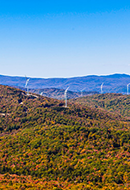What is eco-anxiety
Eco-anxiety: the psychological aftermath of the climate crisis
Climate change is a reality and threatens the future of the Earth. This can cause psychological impacts on some people, a phenomenon which is known as eco-anxiety. Below, we review what it is, what causes it, what its symptoms are and what we can do to avoid it while taking care of the planet.

Although it is a neologism, the term “eco-anxiety” has already carved out a significant space in the timetables of psychologists around the world and, of course, in some people daily lives. Natural disasters, which are becoming more frequent and more extreme as a result of climate change - such as the fires that devastated Australia or Cyclone Idai, which wiped Mozambique's fourth largest city (Beira) off the map - have caused many people to suffer from eco-anxiety without even knowing what it is.
What is eco-anxiety. Causes
Eco-anxiety is not considered a disease, at least not yet, but the heightened concern about the climate emergency we are experiencing can lead to psychological disorders. The American Psychology Association (APA) describes eco-anxiety as “the chronic fear of environmental cataclysm that comes from observing the seemingly irrevocable impact of climate change and the associated concern for one's future and that of next generations”. The APA, therefore, considers that the internalisation of the great environmental problems that affect our planet can have psychological consequences of varying seriousness in some people.
So what are the major environmental problems associated with climate change? We are talking about the proliferation of extreme weather phenomena (heat waves and fires, cyclones and typhoons, earthquakes and tidal waves, etc.), the increase in pollution and its impact on health, the accumulation of rubbish in the oceans, the loss of biodiversity, water stress and water shortages, the overexploitation of natural resources and deforestation, and rising sea levels, among others.
According to the survey conducted by UNDP, Oxford University and GeoPoll, 56% of respondents think at least once a week about the problems caused by the climate situation. Furthermore, 53% said they were more concerned about the same situation in the previous year. The number rises when referring to developing countries, where the percentage rises to 63%.
How eco-anxiety affects people
Eco-anxiety does not affect everyone equally. In fact, it tends to be more prevalent among people who are more aware about the protection of the environment. The symptoms include the following: slight cases of anxiety, stress, sleep disturbances, nervousness, etc. In the more serious cases, eco-anxiety can cause a sensation of suffocation or even depression. Among the latter group, it is quite common for people to express a strong sense of guilt about the situation of the planet, which can be aggravated, among those who have children, when thinking about their future.
How does climate change affect physical, mental and community health?
Climate impacts
-
Air pollution
-
Forest fires
-
Rising sea level
-
Temperature increases
-
Extreme weather phenomena
-
Droughts
-
Community health

- Changes in physical fitness at activity level.
- Increase in heat-related episodes.
- Rise in allergies.
- Increased exposure to waterborne diseases.
Mental health

- Stress, anxiety, depression, grief, feeling of loss.
- Tension in social relations.
- Substance abuse.
- Post-traumatic stress disorders.
Community health

- Increase in interpersonal aggression.
- Increasing violence and crime.
- Increased social instability.
- Reduction of social cohesion.
Source: US Global Change Research Program.
 SEE INFOGRAPHIC: How does climate change affect physical, mental and community health? [PDF]
SEE INFOGRAPHIC: How does climate change affect physical, mental and community health? [PDF]
Eco-anxiety is a new concept, but it is closely linked to another, solastalgia, which the medical journal Lancet already included in 2015 as a term related to the impact of climate change on human well-being. Solastalgia, which is also not considered a disease, was coined by the Australian philosopher Glenn Albrecht and defines the set of psychological disorders that occur in a native population following destructive changes in their territory, whether as a result of human activities or the climate.
Solastalgia therefore affects people who have already suffered the consequences of a natural disaster and this what differentiates it from eco-anxiety. According to a report by MIT (Massachusetts Institute of Technology) among survivors of Hurricane Katrina in 2005, people who have suffered a natural disaster are 4% more likely to have a mental illness, in addition to suffering from post-traumatic stress or depression.
You may also be interested in

Mental hygiene: things to look after your mind
Living puts our psychological well-being to the test

Mindfulness: boost your performance
With mindfulness we become observers in the moment.

Iberdrola, global leader in climate action
Climate Action Plan establishes the objectives of achieving carbon neutrality
Tips for overcoming eco-anxiety
The effects of eco-anxiety can be minimised like any other anxiety-related disorder, i.e. by looking for the positive side in any circumstance, working on emotional regulation in the face of one's own impulses, developing resilience in order to face adversities, etc. Another key factor, at least to reduce the feeling of guilt, is to do our bit in caring for the planet, promoting a sustainable lifestyle both in ourselves and in others. Here are some tips.
![]() Knowing the enemy is fundamental and that is where climate change education comes in. Raise your own and others' awareness of the problem.
Knowing the enemy is fundamental and that is where climate change education comes in. Raise your own and others' awareness of the problem.
![]() Do sustainable activities, such as setting up an urban garden or plogging (going running and picking up plastic from the ground).
Do sustainable activities, such as setting up an urban garden or plogging (going running and picking up plastic from the ground).
![]() Commit to responsible consumption and recycling to protect the environment as much as possible. Also reduce your plastics consumption.
Commit to responsible consumption and recycling to protect the environment as much as possible. Also reduce your plastics consumption.
![]() Commit to sustainable mobility and sustainable food. Your health and that of the planet will be grateful.
Commit to sustainable mobility and sustainable food. Your health and that of the planet will be grateful.
![]() Avoid those little things that pollute, such as leaving the tap running or throwing chewing gum on the ground, because even the smallest detail counts.
Avoid those little things that pollute, such as leaving the tap running or throwing chewing gum on the ground, because even the smallest detail counts.
One piece of positive news in the fight against eco-anxiety is that climate problems are causing a change in awareness of the need to take care of the planet among a large part of the population. According to the People's Climate Vote survey, 80% of respondents want their government to take stronger action to tackle the climate crisis, while 86% say governments should work together to improve the situation. Green activism continues to rise, with only 7% globally against taking action in favour of a green transition and phasing out fossil fuels.







